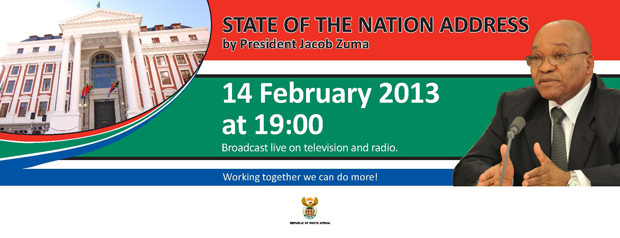The annual State of the Nation Address (SoNA) is a significant event in the government calendar. The President delivers it to a joint sitting of Parliament where he outlines the key achievements and priorities of government.
It sets a clear tone for the year ahead and is an opportunity for the President to directly share this with the nation, and the world. This is year it was delivered within the context of the adopted National Development Plan for the country.
The President highlighted the past year achievements and he indicated the key challenges facing the country. Significantly, he highlighted the key programme areas government will be focussing on in the current year- which builds on the five year programme this Administration committed to in 2009.
SoNA also stimulates discourse in the country about pertinent issues South Africans think the President, and in effect the Government should be paying more attention to. The President has solicited inputs from the various stakeholders on issues they would like him to focus on. As the President of the country it is however important for him to take a decisive stance on issues that are in the best interest of the country- of course within the available purse.

The annual SoNa is therefore not just a prepared speech by the President; it is a speech that takes into account the pulse of the nation and needs of the country. However, during an hour-long address it is not feasible for the President to provide extensive details on every announcement and commitment he makes. More details and specifics on the pronouncements emanating from the SoNA are generally provided during post SoNA briefings by relevant government clusters.
In the period preceding this year’s SoNA, the country witnessed some unfortunate events and developments. Particularly worrying were the unacceptable incidents of rape and gender-based violence that occurred. As government we are extremely concerned about this and the President has made it quite clear in his speech that we have to “end this scourge in our society”.
Delivering his fifth SoNA since 2009, President Jacob Zuma said he “directed law enforcement agencies to treat these cases with the utmost urgency and importance”. He pointed out that during the last financial year the Family Violence, Child Protection and Sexual Offences Units “secured over 363 life sentences, with a conviction rate of 73% for crimes against women above 18 years old and 70% for crimes against children under 18 years of age. “This conviction rate can be 100% if all of us get involved in rooting out this crime within our communities.
The President provided feedback on progress made on the five priorities of government, namely education, health, the fight against crime, creating decent work as well as rural development and land reform.
On infrastructure he highlighted government’s investment in infrastructure development and stated: “By the end of March this year, starting from 2009, government will have spent about R860-billion on infrastructure. Various projects are being implemented around the country.”
The President added: “We have also rolled out 315 000 solar water geysers as of January this year, most of which were given to poor households, many of whom had never had running hot water before. Close to 200 000 households have been connected to the national electricity grid in 2012.”
He underlined successes in the fight against corruption, tender fraud and price fixing particularly in the infrastructure programme. The President stated: “The state has collected a substantial dossier of information on improper conduct by large construction companies. This is now the subject of formal processes of the competition commission and other law enforcement authorities.”
The President reiterated his commitment to root out corruption in the public and private sectors. He stated: “I have since 2009, signed 34 proclamations directing the SIU to investigate allegations of corruption, fraud or maladministration in various government departments and state entities. The Asset Forfeiture Unit seized assets valued at more than R541 million. A total of R61 millions of these assets have already been forfeited to the State.”
With regard to job creation, the President described the way forward stating that an agreement has been reached on key principles around the R3-billion that had been set aside for the Jobs Fund and that an accord will be signed this year. Emphasising that the role of creating jobs is not the sole responsibility of government, he appealed to the private sector to play their part by absorbing Further Education and Training (FET) graduates.
While the President welcomed the 2012 Grade 12 pass rate and improvement in the Annual National Assessments (ANA) results in our schools, he nevertheless announced plans to improve maths, science, and technology through the establishment of a national task team “to strengthen the implementation of the Mathematics, Science and Technology Strategy”.
The President clarified his position on the matter of declaring education as an essential service. He stated: “By saying education is an essential service we are not taking away the Constitutional rights of teachers as workers such as the right to strike. It means we want the education sector and society as a whole to take education more seriously than is happening currently.”
The President also went to great lengths to point out solutions to improve the outcome of the educational system saying: “Decent salaries and conditions of service will play an important role in attracting, motivating and retaining skilled teachers. In this regard, we will establish a Presidential Remuneration Commission which will investigate the appropriateness of the remuneration and conditions of service provided by the State to all its employees.”
The President has spoken, we have the game plan for the year to advance South Africa which as outlined in the National Development Plan. We therefore call on South Africans who have an interest in building a better country for ourselves and the future generations to come to play “their part” and support the plan.
Phumla Williams is Acting CEO of the Government Communications and Information System (GCIS)




